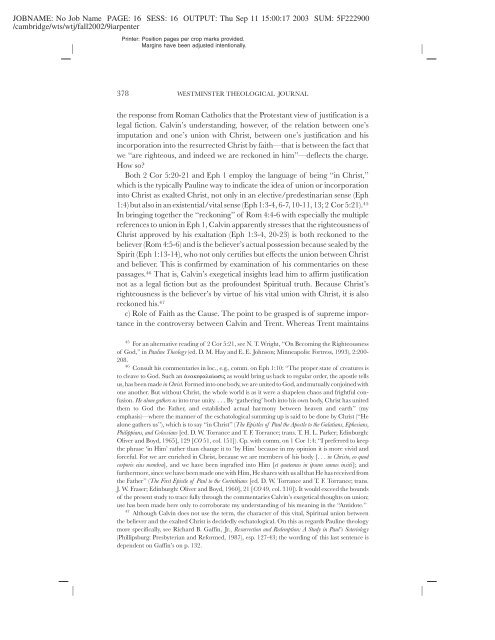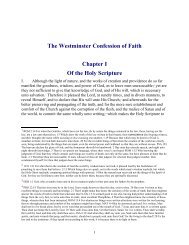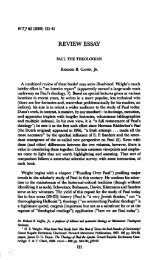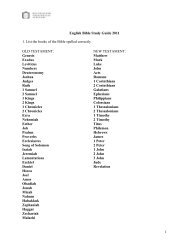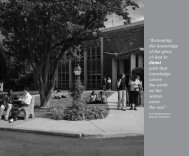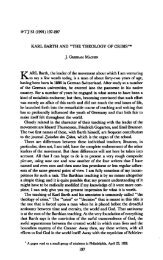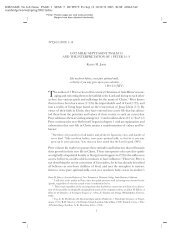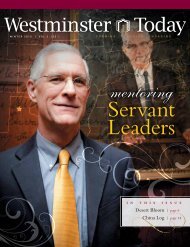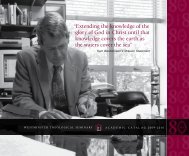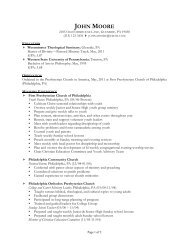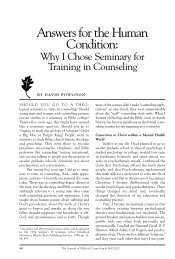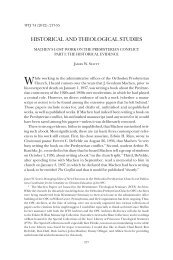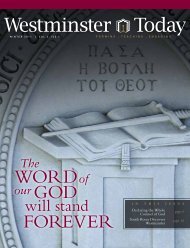A Question of Union with Christ? Calvin and Trent on Justification
A Question of Union with Christ? Calvin and Trent on Justification
A Question of Union with Christ? Calvin and Trent on Justification
Create successful ePaper yourself
Turn your PDF publications into a flip-book with our unique Google optimized e-Paper software.
JOBNAME: No Job Name PAGE: 16 SESS: 16 OUTPUT: Thu Sep 11 15:00:17 2003 SUM: 5F222900<br />
/cambridge/wts/wtj/fall2002/9ìarpenter<br />
Printer: Positi<strong>on</strong> pages per crop marks provided.<br />
Margins have been adjusted intenti<strong>on</strong>ally.<br />
378 WESTMINSTER THEOLOGICAL JOURNAL<br />
the resp<strong>on</strong>se from Roman Catholics that the Protestant view <str<strong>on</strong>g>of</str<strong>on</strong>g> justificati<strong>on</strong> is a<br />
legal ficti<strong>on</strong>. <str<strong>on</strong>g>Calvin</str<strong>on</strong>g>’s underst<str<strong>on</strong>g>and</str<strong>on</strong>g>ing, however, <str<strong>on</strong>g>of</str<strong>on</strong>g> the relati<strong>on</strong> between <strong>on</strong>e’s<br />
imputati<strong>on</strong> <str<strong>on</strong>g>and</str<strong>on</strong>g> <strong>on</strong>e’s uni<strong>on</strong> <str<strong>on</strong>g>with</str<strong>on</strong>g> <str<strong>on</strong>g>Christ</str<strong>on</strong>g>, between <strong>on</strong>e’s justificati<strong>on</strong> <str<strong>on</strong>g>and</str<strong>on</strong>g> his<br />
incorporati<strong>on</strong> into the resurrected <str<strong>on</strong>g>Christ</str<strong>on</strong>g> by faith—that is between the fact that<br />
we ‘‘are righteous, <str<strong>on</strong>g>and</str<strong>on</strong>g> indeed we are reck<strong>on</strong>ed in him’’—deflects the charge.<br />
How so<br />
Both 2 Cor 5:20-21 <str<strong>on</strong>g>and</str<strong>on</strong>g> Eph 1 employ the language <str<strong>on</strong>g>of</str<strong>on</strong>g> being ‘‘in <str<strong>on</strong>g>Christ</str<strong>on</strong>g>,’’<br />
which is the typically Pauline way to indicate the idea <str<strong>on</strong>g>of</str<strong>on</strong>g> uni<strong>on</strong> or incorporati<strong>on</strong><br />
into <str<strong>on</strong>g>Christ</str<strong>on</strong>g> as exalted <str<strong>on</strong>g>Christ</str<strong>on</strong>g>, not <strong>on</strong>ly in an elective/predestinarian sense (Eph<br />
1:4) but also in an existential/vital sense (Eph 1:3-4, 6-7, 10-11, 13; 2 Cor 5:21). 45<br />
In bringing together the ‘‘reck<strong>on</strong>ing’’ <str<strong>on</strong>g>of</str<strong>on</strong>g> Rom 4:4-6 <str<strong>on</strong>g>with</str<strong>on</strong>g> especially the multiple<br />
references to uni<strong>on</strong> in Eph 1, <str<strong>on</strong>g>Calvin</str<strong>on</strong>g> apparently stresses that the righteousness <str<strong>on</strong>g>of</str<strong>on</strong>g><br />
<str<strong>on</strong>g>Christ</str<strong>on</strong>g> approved by his exaltati<strong>on</strong> (Eph 1:3-4, 20-23) is both reck<strong>on</strong>ed to the<br />
believer (Rom 4:5-6) <str<strong>on</strong>g>and</str<strong>on</strong>g> is the believer’s actual possessi<strong>on</strong> because sealed by the<br />
Spirit (Eph 1:13-14), who not <strong>on</strong>ly certifies but effects the uni<strong>on</strong> between <str<strong>on</strong>g>Christ</str<strong>on</strong>g><br />
<str<strong>on</strong>g>and</str<strong>on</strong>g> believer. This is c<strong>on</strong>firmed by examinati<strong>on</strong> <str<strong>on</strong>g>of</str<strong>on</strong>g> his commentaries <strong>on</strong> these<br />
passages. 46 That is, <str<strong>on</strong>g>Calvin</str<strong>on</strong>g>’s exegetical insights lead him to affirm justificati<strong>on</strong><br />
not as a legal ficti<strong>on</strong> but as the pr<str<strong>on</strong>g>of</str<strong>on</strong>g>oundest Spiritual truth. Because <str<strong>on</strong>g>Christ</str<strong>on</strong>g>’s<br />
righteousness is the believer’s by virtue <str<strong>on</strong>g>of</str<strong>on</strong>g> his vital uni<strong>on</strong> <str<strong>on</strong>g>with</str<strong>on</strong>g> <str<strong>on</strong>g>Christ</str<strong>on</strong>g>, it is also<br />
reck<strong>on</strong>ed his. 47<br />
c) Role <str<strong>on</strong>g>of</str<strong>on</strong>g> Faith as the Cause. The point to be grasped is <str<strong>on</strong>g>of</str<strong>on</strong>g> supreme importance<br />
in the c<strong>on</strong>troversy between <str<strong>on</strong>g>Calvin</str<strong>on</strong>g> <str<strong>on</strong>g>and</str<strong>on</strong>g> <str<strong>on</strong>g>Trent</str<strong>on</strong>g>. Whereas <str<strong>on</strong>g>Trent</str<strong>on</strong>g> maintains<br />
45 For an alternative reading <str<strong>on</strong>g>of</str<strong>on</strong>g> 2 Cor 5:21, see N. T. Wright, ‘‘On Becoming the Righteousness<br />
<str<strong>on</strong>g>of</str<strong>on</strong>g> God,’’ in Pauline Theology (ed. D. M. Hay <str<strong>on</strong>g>and</str<strong>on</strong>g> E. E. Johns<strong>on</strong>; Minneapolis: Fortress, 1993), 2:200-<br />
208.<br />
46 C<strong>on</strong>sult his commentaries in loc., e.g., comm. <strong>on</strong> Eph 1:10: ‘‘The proper state <str<strong>on</strong>g>of</str<strong>on</strong>g> creatures is<br />
to cleave to God. Such an £nakefala…wsij as would bring us back to regular order, the apostle tells<br />
us, has been made in <str<strong>on</strong>g>Christ</str<strong>on</strong>g>. Formed into <strong>on</strong>e body, we are united to God, <str<strong>on</strong>g>and</str<strong>on</strong>g> mutually c<strong>on</strong>joined <str<strong>on</strong>g>with</str<strong>on</strong>g><br />
<strong>on</strong>e another. But <str<strong>on</strong>g>with</str<strong>on</strong>g>out <str<strong>on</strong>g>Christ</str<strong>on</strong>g>, the whole world is as it were a shapeless chaos <str<strong>on</strong>g>and</str<strong>on</strong>g> frightful c<strong>on</strong>fusi<strong>on</strong>.<br />
He al<strong>on</strong>e gathers us into true unity. ...By‘gathering’ both into his own body, <str<strong>on</strong>g>Christ</str<strong>on</strong>g> has united<br />
them to God the Father, <str<strong>on</strong>g>and</str<strong>on</strong>g> established actual harm<strong>on</strong>y between heaven <str<strong>on</strong>g>and</str<strong>on</strong>g> earth’’ (my<br />
emphasis)—where the manner <str<strong>on</strong>g>of</str<strong>on</strong>g> the eschatological summing up is said to be d<strong>on</strong>e by <str<strong>on</strong>g>Christ</str<strong>on</strong>g> (‘‘He<br />
al<strong>on</strong>e gathers us’’), which is to say ‘‘in <str<strong>on</strong>g>Christ</str<strong>on</strong>g>’’ (The Epistles <str<strong>on</strong>g>of</str<strong>on</strong>g> Paul the Apostle to the Galatians, Ephesians,<br />
Philippians, <str<strong>on</strong>g>and</str<strong>on</strong>g> Colossians [ed. D. W. Torrance <str<strong>on</strong>g>and</str<strong>on</strong>g> T. F. Torrance; trans. T. H. L. Parker; Edinburgh:<br />
Oliver <str<strong>on</strong>g>and</str<strong>on</strong>g> Boyd, 1965], 129 [CO 51, col. 151]). Cp. <str<strong>on</strong>g>with</str<strong>on</strong>g> comm. <strong>on</strong> 1 Cor 1:4: ‘‘I preferred to keep<br />
the phrase ‘in Him’ rather than change it to ‘by Him’ because in my opini<strong>on</strong> it is more vivid <str<strong>on</strong>g>and</str<strong>on</strong>g><br />
forceful. For we are enriched in <str<strong>on</strong>g>Christ</str<strong>on</strong>g>, because we are members <str<strong>on</strong>g>of</str<strong>on</strong>g> his body [. . . in <str<strong>on</strong>g>Christ</str<strong>on</strong>g>o, eo quod<br />
corporis eius membra], <str<strong>on</strong>g>and</str<strong>on</strong>g> we have been ingrafted into Him [et quatemus in ipsum sumus insiti ]; <str<strong>on</strong>g>and</str<strong>on</strong>g><br />
furthermore, since we have been made <strong>on</strong>e <str<strong>on</strong>g>with</str<strong>on</strong>g> Him, He shares <str<strong>on</strong>g>with</str<strong>on</strong>g> us all that He has received from<br />
the Father’’ (The First Epistle <str<strong>on</strong>g>of</str<strong>on</strong>g> Paul to the Corinthians [ed. D. W. Torrance <str<strong>on</strong>g>and</str<strong>on</strong>g> T. F. Torrance; trans.<br />
J. W. Fraser; Edinburgh: Oliver <str<strong>on</strong>g>and</str<strong>on</strong>g> Boyd, 1960], 21 [CO 49, col. 310]). It would exceed the bounds<br />
<str<strong>on</strong>g>of</str<strong>on</strong>g> the present study to trace fully through the commentaries <str<strong>on</strong>g>Calvin</str<strong>on</strong>g>’s exegetical thoughts <strong>on</strong> uni<strong>on</strong>;<br />
use has been made here <strong>on</strong>ly to corroborate my underst<str<strong>on</strong>g>and</str<strong>on</strong>g>ing <str<strong>on</strong>g>of</str<strong>on</strong>g> his meaning in the ‘‘Antidote.’’<br />
47 Although <str<strong>on</strong>g>Calvin</str<strong>on</strong>g> does not use the term, the character <str<strong>on</strong>g>of</str<strong>on</strong>g> this vital, Spiritual uni<strong>on</strong> between<br />
the believer <str<strong>on</strong>g>and</str<strong>on</strong>g> the exalted <str<strong>on</strong>g>Christ</str<strong>on</strong>g> is decidedly eschatological. On this as regards Pauline theology<br />
more specifically, see Richard B. Gaffin, Jr., Resurrecti<strong>on</strong> <str<strong>on</strong>g>and</str<strong>on</strong>g> Redempti<strong>on</strong>: A Study in Paul’s Soteriology<br />
(Phillipsburg: Presbyterian <str<strong>on</strong>g>and</str<strong>on</strong>g> Reformed, 1987), esp. 127-43; the wording <str<strong>on</strong>g>of</str<strong>on</strong>g> this last sentence is<br />
dependent <strong>on</strong> Gaffin’s <strong>on</strong> p. 132.


